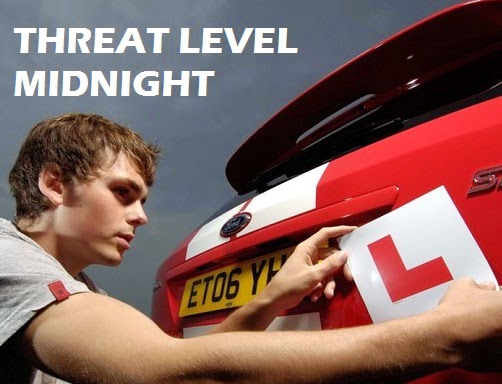How much can instructors be reasonably expected to understand about the psychology of their pupils?
Following on from my last post about unit 6.4.1. of the NSDRT document we focus on the knowledge and understanding requirements of minimising risk. This segment would have been much more helpful to instructors if it had some some reference materials listed so we could obtain the specialist knowledge required to fulfill the new criteria. I'm sure you'll see what I mean.
We must know and understand the signs that a learner's fitness may be impaired by alcohol, drugs or prescription medicines. How do we do this? Apart from using your eyes and ears, combined with the gut feeling you get from experience I don't think there's a lot to go on. Pupils are regularly tired, irritable or have other things on their mind which all adversely effect driving performance. When a pupil gives the signs of any of these I ask if they are OK to drive and I suggest we make the lesson less demanding than previously planned. The signs would be more or less the same if a pupil was under the influence of drink or drugs. So what specific signs are we looking for?
Item b) tells us we must know the signs that a learner may be suffering from a physical or psychological condition making them unfit for the lesson. This includes conditions that the learner may be unaware of or trying to hide. We are not trained doctors, we are driving instructors. How am I supposed to know that a person has a psychological condition they are unaware of? This is not my field of expertise and I find it unfair that these requirements are being imposed on us without any real support. Physical conditions would be easier to spot but you would hope the learner would be aware this and not try to hide it.
What do you do if you believe a learner is unfit to be trained or has a permanent physical or psychological condition they have not revealed. I would stop the lesson certainly. Other than that I would talk to them as best I could given my skills and experience as a driving instructor. Other than that I don't know where to acquire the specialist knowledge the document seems to hint at.
Knowing how far you are responsible for the health and safety of yourself and others is somewhat abstract. How far and on what scale? What is the criteria for this. We know we are sharing responsibility so we're not 100% responsible. How far is too far or not enough? This item doesn't make sense to me.
Knowing what action we can take and how to use dual controls brings us back into the real world. I expect we all know how to use dual controls and move the steering wheel etc. They're the basics of our everyday working lives. I've had a problem with a small number of clients when it comes to feedback on risk-related issues provoking a fear based response. Some learners and their parents just don't want to know about real life and expect to drive around as if in a huge ball of protective cotton wool. This is unacceptable. We've got to make people aware of the risk or we are not doing our jobs properly. If you're old enough to drive then you're old enough to deal with the issues around driving I say.
Once I encountered deliberate behaviour that placed us at risk. A disturbed young man aimed the car at a lamp post before swearing at me. Don't know why he did it. He just exploded in rage. I kept calm, drove him home and made sure we were all square money wise. I bade him goodbye and left. That's all you can do really. We must demonstrate consistent attitudes ourselves so when we do say something of a serious nature it is not taken as being frivolous. I've enjoyed writing this post. I feel I've got a lot off my chest.

As a driving instructor you need to be so many things, a businessman, a marking guy, a physiologist, an accountant, a web developer, a teacher, an instructor, a safety expert and it goes on…..
ReplyDeleteThis is why I like the job, lots of different things to get your teeth into, in response to your post if I had a pupil that did not seem fit to drive then I would stop the lesson. I have even had this in the past where I have then had to drive the pupil home or even a few months ago not start the lesson, I turned up at the pupils house and I asked how they were doing, they did not look well, they said they were fine but I dug a little deeper and they admitted they were very tired and suffering from severe hay-fever, they said if they needed to drive on a non-lesson scenario they would not drive, so we agreed to postpone the lesson until they were feeling better.